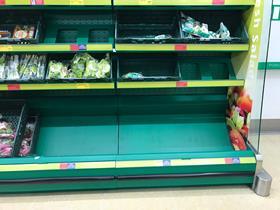
A major UK retailer is considering introducing rationing, one of its senior executives has told the BBC.
The measure will prevent companies that have not made contingency plans for a no-deal Brexit from stockpiling and essentially using retailers as wholesalers.
The anonymous source told the BBC he didn’t think the limits would affect normal retail customers, but said the supermarket “would needto limit the amount restaurants or convenience stores, for example, that are short of stock could buy”.
'We wouldn't use the word rationing but that is effectively what it is,” he added. “Limiting the volumes small businesses can purchase so that our retail customers get a chance to get what they need.'
Retailers already use a form of rationing to limit the number of items that people can buy on special promotion, and according to the source, no-deal Brexit rationing would be similar, with the limits marked on shelf labels and enforced when you pay.
By contrast, a former employee at one of the discounters said the attitude at Aldi and Lidl would be different.
'You don't lose points for selling out – in fact it enhances the 'value' proposition to shoppers – this was such a good deal it's now gone,' the source said. 'The truth is, a lot of market traders, restaurants and convenience stores already use discount grocery retailers as wholesalers.'
These announcementscome shortly after government documents were leaked warning Britain of possible food shortages in the event of a no-deal Brexit.
The documents on ‘Operation Yellowhammer’ warned that the UK will face major disruption at its ports for three months, a hard Irish border and shortages of food and medicine in the event of a no-deal.
Will Broome,chief executive and founder of shopping app Ubamarket, stressed that the extended Brexit deadline of 31 October is “not ideal” for food outlets as most retailers have already started accumulating stock for Christmas.
This means warehouses are already full of frozen, chilled and ambient goods, leaving little capacity for stockpiling.
He added: “The beginning of autumn sees the UK much more reliant on overseas fresh produce. If there are to be food shortages after we leave the European Union, then retailers need to think of viable and efficient ways to manage their stock.
“App technology may not be an alternative that retailers have previously thought of, however, by collecting data on consumers' behaviours, it can track which products customers are most likely to buy, helping retailers to stocktake.'
The app recently conducted research on how they think Brexit will affect the price of their weekly food shop.
In a survey of 2,000 UK adults, 59 per cent said they think Brexit will increase the price of food and produce in supermarkets, while 57 per cent believe Brexit will make European goods in supermarkets considerably more expensive.



